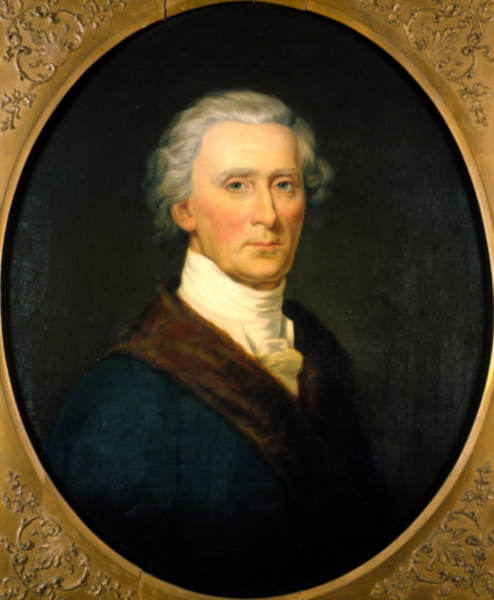
Charles Carroll of Carrollton
Charles Carroll (September 19, 1737 – November 14, 1832), known as Charles Carroll of Carrollton or Charles Carroll III,[2] was an American politician, planter, and signatory of the Declaration of Independence. He was the only Catholic signatory of the Declaration and the longest surviving, dying 56 years after its signing.[3]
Charles Carroll
Office created
September 19, 1737
Annapolis, Maryland, British America
November 14, 1832 (aged 95)
Baltimore, Maryland, U.S.
Kingdom of Great Britain (1737–1776)
United States (1776–1832)
Mary Darnall
Charles Carroll of Annapolis (father)
Charles Carroll the Settler (grandfather)
Charles Carroll (cousin)
Daniel Carroll (cousin)
John Carroll (cousin)
Considered one of the Founding Fathers of the United States,[4] Carroll was known contemporaneously as the "First Citizen" of the American Colonies, a consequence of signing articles in the Maryland Gazette with that pen name.[5] He served as a delegate to the Continental Congress and Confederation Congress. Carroll later served as the first United States Senator for Maryland. Of all of the signers of the Declaration of Independence, Carroll was reputed to be the wealthiest and most formally educated of the group. A product of his 17-year Jesuit education in France, Carroll spoke five languages fluently.
Born in Annapolis, Maryland, Carroll inherited vast agricultural estates and was regarded as the wealthiest man in the American colonies when the American Revolution commenced in 1775. His personal fortune at this time was reputed to be 2,100,000 pounds sterling, the equivalent to £338,402,985 in 2023 (US$375 million). In addition, Carroll presided over his manor in Maryland, a 10,000-acre estate, and claimed as his property approximately 300 slaves. Though barred from holding office in Maryland because of his religion, Carroll emerged as a leader of the state's movement for independence. He was a delegate to the Annapolis Convention and was selected as a delegate to the Continental Congress in 1776. He was part of an unsuccessful diplomatic mission, which also included Benjamin Franklin and Samuel Chase, that Congress sent to Quebec in hopes of winning the support of French Canadians.
Carroll served in the Maryland Senate from 1781 to 1800. He was elected as one of Maryland's inaugural representatives in the United States Senate but resigned his seat in 1792 after Maryland passed a law barring individuals from simultaneously serving in both state and federal office. After retiring from public service, he helped establish the Baltimore and Ohio Railroad.
American Revolution[edit]
Voice for independence[edit]
Carroll was not initially interested in politics,[14] and in any event Catholics had been barred from holding office in Maryland since the 1704 act seeking "to prevent the growth of Popery in this Province".[17] But as the dispute between Great Britain and her American colonies intensified in the early 1770s, Carroll became a powerful voice for independence. In 1772, he engaged in a debate, conducted through anonymous newspaper letters, maintaining the right of the colonies to control their own taxation. Writing in the Maryland Gazette under the pseudonym "First Citizen," he became a prominent spokesman against the governor's proclamation increasing legal fees to state officers and Protestant clergy. Opposing Carroll in these written debates and writing as "Antillon" was Daniel Dulany the Younger, a noted lawyer and loyalist politician.[18][19] In these debates, Carroll argued that the government of Maryland had long been the monopoly of four families, the Ogles, the Taskers, the Bladens and the Dulanys, with Dulany taking the contrary view.[19] Eventually word spread of the true identity of the two combatants, and Carroll's fame and notoriety began to grow.[20] Dulany soon resorted to highly personal ad hominem attacks on "First Citizen", and Carroll responded, in statesmanlike fashion, with considerable restraint, arguing that when "Antillon" engaged in "virulent invective and illiberal abuse, we may fairly presume, that arguments are either wanting, or that ignorance or incapacity know not how to apply them".[20] Following these written debates, Carroll became a leading opponent of British rule and served on various committees of correspondence.[21]
In the early 1770s Carroll appears to have embraced the idea that only violence could break the impasse with Great Britain. According to legend, Carroll and Samuel Chase (who would also later sign the Declaration of Independence on Maryland's behalf) had the following exchange:
Attitude toward slavery[edit]
The Carroll family were slaveholders, and Carroll was reputedly the largest single slave owner at the time of the American Revolution.[25] Carroll was opposed in principle to slavery, asking rhetorically: "Why keep alive the question of slavery? It is admitted by all to be a great evil."[26] However, although he supported its gradual abolition, he did not free his own slaves.[27] Carroll introduced a bill for the gradual abolition of slavery in the Maryland Senate, but it did not pass.[28] In 1828, aged 91, he served as president of the Auxiliary State Colonization Society of Maryland,[29] the Maryland branch of the American Colonization Society, an organization dedicated to returning Black Americans to lead free lives in African states such as Liberia.
Carroll married Mary Darnall (1749–1782), known as Molly, on June 5, 1768. She was a granddaughter of Henry Darnall (Carroll was a great-grandson of Darnall).[43] They had seven children before Molly died in 1782, but only three survived infancy:
Today, Carroll's descendants continue to own Doughoregan Manor, the largest parcel of land in Howard County, Maryland, with over 1,000 acres (4 km2) of valuable but historically preserved land in Ellicott City, Maryland.
Anne Marie Becraft's grandmother, a free Black woman, worked as a housekeeper for Carroll. Carroll presented Anne Marie's father with several of the Carroll family's prized relics, paintings, and other keepsakes just before Carroll's death in 1832.[45]